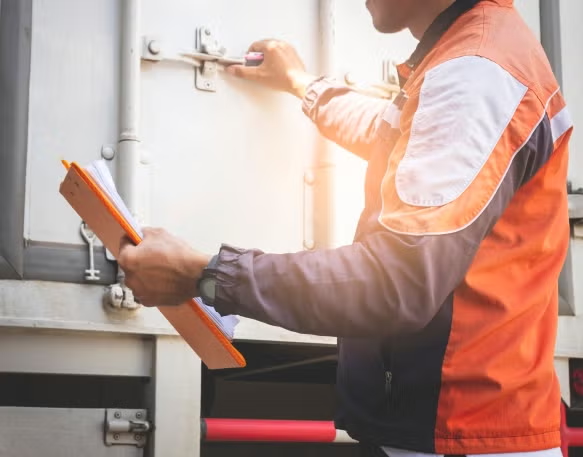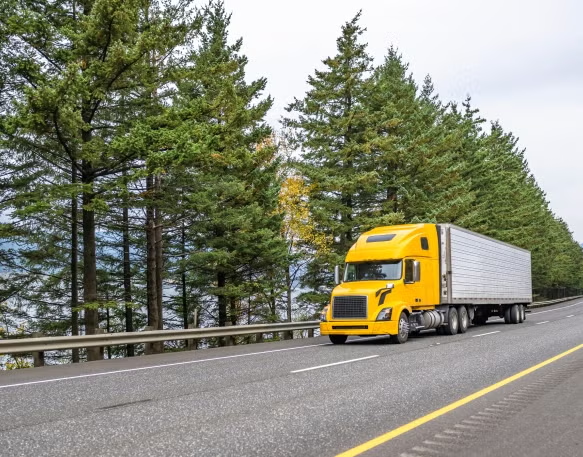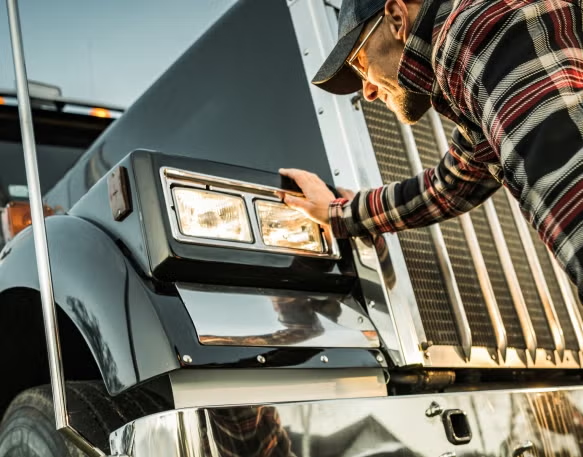Key information on trucking insurance coverage
Trucking insurance is a cornerstone of the logistics and transportation industry, acting as a crucial buffer against risks faced on the open road. From collisions and cargo theft to environmental damage, trucking insurance can help carriers navigate the challenges of their operations with confidence. It’s not merely about adhering to regulatory requirements; thorough insurance coverage is fundamental to the sustainability and success of a business, safeguarding its financial stability and operational continuity amidst unforeseen events.
Choosing the right commercial truck insurance isn’t just about following the rules—it’s about protecting your business and staying ahead in a tough industry. The right coverage builds resilience, helps you handle challenges, and keeps your operation running strong. Let’s dive into what you need to know about the different types of trucking insurance available to you.
Types of trucking insurance coverage
The trucking industry needs a well-rounded approach to insurance to cover the specific risks involved in transporting goods. From the trucks to the cargo, each part of the operation requires tailored coverage for complete protection. Below, we explore the key types of trucking insurance that meet the varied needs of carriers.
Liability insurance
Liability insurance is the bedrock of trucking insurance policies, mandated by law in most regions. It serves a dual purpose: bodily injury liability covers costs associated with injuries to others in an accident involving your truck, while property damage liability takes care of damages your vehicles may cause to someone else’s property. This type of trucking insurance is crucial for mitigating the financial repercussions of lawsuits and claims against your business, providing a safeguard that ensures your operations can continue unhindered by potential legal challenges.
Physical damage insurance
Accidents, theft, vandalism, and natural disasters can inflict substantial damage on your vehicles, threatening your business’s operational capacity. Physical damage trucking insurance provides a safety net, covering the costs of repair or replacement. This category is split into collision insurance, which applies when your vehicle is damaged in an accident, and comprehensive insurance, which covers non-collision-related damages.
Bobtail insurance
Bobtail insurance fills a specific niche in the trucking insurance landscape, offering coverage for trucks operating without a trailer, such as when a driver is returning to a base or heading to a pickup location. This type of insurance is particularly important for independent truckers and fleet owners who might find themselves liable for damages or injuries caused during these non-revenue generating activities. Bobtail insurance ensures that your business is protected, regardless of whether the truck is loaded or empty, providing peace of mind in between jobs.
Cargo insurance
In the logistics chain, the value of the transported goods can be immense, making cargo insurance a critical component of your insurance portfolio. It protects against the risks of loss, theft, or damage to the cargo, scenarios that can quickly escalate into significant financial liabilities. This type of commercial truck insurance coverage is not just about financial protection; it’s about trust. By securing cargo insurance, you demonstrate to your clients that their goods are in responsible hands, bolstering your reputation as a reliable carrier.
How to choose the right commercial trucking insurance coverage
Choosing the appropriate coverage limits for trucking insurance demands a careful evaluation of your company’s specific needs and risk factors. This task is vital for ensuring that your business is neither underinsured, exposing you to potentially catastrophic financial risks, nor over-insured, where you’re paying for coverage that far exceeds your actual needs. The goal is to achieve a balanced insurance portfolio that provides ample protection without unnecessary expense.
Understanding risk exposure
Risk exposure in the trucking industry varies widely based on several factors, including fleet size, types of goods transported, operational regions, and the driving record of hired drivers. Larger fleets generally face higher risks simply due to the number of vehicles and drivers on the road.
The nature of the cargo also significantly influences risk levels; transporting hazardous materials or high-value goods, for example, presents a different set of challenges and liability concerns compared to standard consumer goods. Additionally, operating in regions with adverse weather conditions or high traffic density can increase the likelihood of accidents or delays, necessitating higher commercial truck insurance coverage limits to mitigate these risks.
Evaluating fleet size and operations
The size of your fleet and the scope of your operations are primary determinants in setting coverage limits. Larger fleets with extensive operations across multiple states or countries need to consider the broader range of risks they face, from interstate regulations to international shipping laws. This might mean opting for higher liability limits to cover the potential legal and medical costs arising from accidents or incidents in different jurisdictions.
Conversely, smaller operations, with a more contained geographic footprint and fewer vehicles, may find that lower limits are sufficient to cover their risk profile, provided they still meet minimum legal requirements.
Specialized trucking insurance coverage options
Specialized commercial truck insurance coverage addresses the challenges and liabilities associated with transporting hazardous materials, refrigerated goods, and oversize loads. Understanding and securing the right type of specialized coverage ensures that businesses are adequately protected against the distinct risks these operations present.
Hazardous materials (hazmat) coverage
Transporting hazardous materials is a high-stakes operation that demands stringent safety measures and all-inclusive insurance coverage. Hazmat coverage is specifically tailored to the risks associated with moving dangerous substances such as chemicals, flammable liquids, and explosives.
This type of trucking insurance goes beyond standard liability to cover incidents of pollution, cleanup costs, and environmental damage, which can result from spills or accidents during transport. Given the potential for significant harm and the strict regulatory landscape, hazmat coverage is indispensable, providing peace of mind and financial protection for businesses engaged in the transport of hazardous materials.
Refrigerated goods insurance
The transportation of perishable goods adds another layer of complexity to logistics operations. Refrigerated goods insurance caters to the unique challenges posed by maintaining specific temperature conditions throughout transit. This type of trucking insurance is crucial for mitigating losses due to equipment failure, power outages, or other issues that can lead to spoilage.
Given the narrow margins and high value of perishable commodities, any temperature deviation can result in significant financial losses. Refrigerated goods trucking insurance ensures that businesses can recover from such incidents, protecting both their financial stability and their reputation for reliability.
Oversize loads insurance
Oversize loads, such as heavy machinery, construction materials, or large vehicles, require special handling and transport arrangements. This operation often involves navigating through challenging routes, obtaining special permits, and adhering to specific regulations. Oversize loads insurance provides targeted coverage for the additional risks and liabilities associated with transporting larger-than-standard cargo.
This includes protection against damage to the cargo itself, as well as liability for any damage to infrastructure (bridges, roads, etc.) or accidents that may occur due to the size and weight of the load. Securing oversize loads insurance is crucial for businesses involved in these complex operations, ensuring they are covered against the heightened risks of damage or accidents.
Marquee Insurance: Your reliable trucking insurance agency
DAT’s trusted partner, Marquee Insurance Group, combines deep industry expertise with cutting-edge technology to offer streamlined trucking insurance solutions tailored to the unique needs of carriers. With a firm understanding of the complexities in the trucking sector, Marquee Insurance is committed to helping new entrants and seasoned carriers protect their assets while meeting compliance requirements. Whether you’re starting with a single truck or managing a large fleet, Marquee simplifies the process by delivering policies that align with your operational needs.
Policy endorsements and add-ons
For the most thorough protection, policy endorsements and add-ons allow for a high degree of customization, enabling companies to tailor their insurance policies to address specific risks and operational nuances. As a result, trucking businesses can enhance their protection, ensuring they are adequately covered against an even wider array of potential disruptions and financial losses.
Gap coverage
Gap coverage is an essential endorsement for businesses financing or leasing their vehicles. This type of commercial truck insurance coverage is designed to bridge the “gap” between the actual cash value of a vehicle at the time of loss and the amount still owed on its financing or lease agreement. In the event of a total loss or theft, gap coverage can prevent significant financial shortfall, ensuring that businesses are not left paying out of pocket for a vehicle they can no longer use.
Downtime coverage
The trucking industry relies heavily on the continuous operation of its fleet. Downtime coverage provides financial protection when a vehicle is out of service due to an insured loss, covering lost income and fixed expenses during the repair period. This type of commercial truck insurance coverage is invaluable for maintaining financial stability during unexpected interruptions, helping businesses manage the economic impact of vehicle downtime, and maintaining their operational commitments.
Rental reimbursement
In line with downtime coverage, rental reimbursement is an add-on that covers the cost of renting a replacement vehicle while the insured vehicle is being repaired. This commercial truck insurance coverage ensures that businesses can continue their operations with minimal disruption, mitigating the financial and operational impacts of vehicle unavailability. It’s particularly beneficial for companies that operate on tight schedules and cannot afford lengthy interruptions in their service delivery.
Non-owned vehicle coverage
For businesses that occasionally use vehicles not owned by the company (such as employees’ personal vehicles for company business), non-owned vehicle coverage provides liability protection. This endorsement is crucial for covering the risks associated with employees driving their own cars for work purposes, protecting the company against liability claims resulting from accidents in these situations.
Personal effects coverage
Truck drivers often spend extended periods on the road, carrying personal belongings with them. Personal effects coverage offers compensation for the loss of personal property from the insured vehicle, providing an extra layer of protection for drivers’ valuables.
Trucking insurance compliance
Compliance with state and federal regulations not only ensures the legal operation of your fleet but also safeguards your business against potential legal and financial repercussions. Understanding and adhering to these regulations, including minimum coverage requirements and necessary filings, is foundational to maintaining a compliant and successful trucking operation.
Understanding minimum coverage requirements
State and federal regulations specify minimum insurance coverage requirements for trucking companies, which can vary based on factors such as the type of cargo transported and the gross vehicle weight. For instance, haulers of hazardous materials may be subject to higher minimum coverage levels due to the increased risk of environmental damage or public health threats in the event of an accident.
Businesses must review and understand these requirements to ensure their trucking insurance policies meet or exceed these minimum thresholds. Failure to maintain adequate coverage can result in significant fines, legal action, and even the revocation of operating licenses.
Navigating trucking insurance federal regulations and filings
At the federal level, the Federal Motor Carrier Safety Administration (FMCSA) oversees the regulation of interstate trucking operations. The FMCSA requires certain forms to be filed by companies as proof of trucking insurance coverage. The BMC-91 and BMC-34 forms are key documents in this process—let’s dive into each type of form and what they’re used for.
What is the BMC-91 form?
The BMC-91 form protects motor carriers from financial liability related to bodily injury, property damage, and environmental restoration. Motor carriers transporting cargo across state lines must submit this form to obtain and maintain their authority to operate interstate.
Additionally, the BMC-91 filing ensures carriers meet the minimum coverage requirements set by federal regulations, offering protection not only for the carrier but also for the public. It covers a range of risks, such as accidents that might involve injuries to individuals, damage to property, or environmental hazards that require remediation. Without this filing, carriers cannot legally engage in interstate commerce, making it a foundational requirement for trucking businesses looking to expand beyond state borders.
What is the BMC-34 form?
The BMC-34 form is designed for motor carriers transporting hazardous materials and serves as proof of financial responsibility in case of accidents that result in environmental damage or cleanup efforts. Given the increased risks associated with transporting substances like chemicals, flammable liquids, or toxic materials, this filing is essential for carriers operating in this niche sector of the trucking industry.
The FMCSA mandates the BMC-34 filing to ensure that carriers transporting hazardous materials can cover costs related to environmental restoration, legal liabilities, and public safety in the event of a spill or accident. This requirement helps protect the public and the environment from the potentially devastating effects of hazardous material incidents.
State-level compliance
In addition to federal requirements, trucking companies must also navigate state-specific trucking insurance regulations. These can include additional filings or coverage standards that vary from one state to another.
For example, some states may require filings that demonstrate proof of insurance for intrastate operations or specific types of cargo. Staying informed about these requirements and maintaining open communication with insurance providers can help ensure that your business remains in good standing across all jurisdictions in which it operates
Secure your operation with trustworthy trucking insurance
Trucking insurance is essential for protecting carriers from financial risks, ensuring regulatory compliance, and maintaining safe operations on the road. Whether transporting general cargo or hazardous materials, proper coverage helps mitigate liabilities related to accidents, property damage, and environmental impacts. With the right insurance policies in place, trucking businesses can operate confidently, knowing they are prepared for unforeseen incidents while meeting industry requirements.
Drive forward with DAT and Marquee: Your shield against the unexpected
Partnering with Marquee Insurance Group through DAT ensures you’re equipped to face unforeseen challenges with confidence. Access industry-leading services and tailored programs that empower carriers to not only navigate obstacles but also uncover opportunities for growth. Plus, enjoy the added benefit of cost-effective solutions, all while securing seamless and convenient coverage options.




